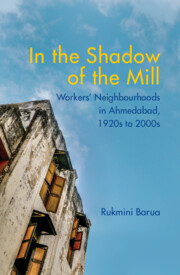3 - The Underground Economy, The State and the Political Intermediary
Published online by Cambridge University Press: 15 June 2022
Summary
The 1970s witnessed a veritable explosion in public conversations about the underground economy in Ahmedabad. Part of this concern stemmed from an increasing visibility of the hooch trade, of smuggling networks and of the rising influence of slumlords. To a great extent, this anxiety was centred around the figure of the ‘anti-social element’ who was alleged to play a key role not only in local politics, but also in the episodes of communal violence that occurred with alarming regularity during this period. Scholarly work on Ahmedabad has remarked upon the growth of the underground economy during this period in the city's history, suggesting that the criminalisation of politics was one of the consequences of the collapse of the textile industry. The disintegration of the industry and the TLA (especially the union's political clout) undoubtedly contributed to crucial transformations in the modes and mechanisms of mediation. The previous chapter adds to this analysis in arguing that a reliance on the ‘anti-social’ and ‘criminal’ elements formed a crucial part of the TLA's political tactics and that the worlds of the union representatives and that of the local thug often overlapped. The 1970s (and Chimanbhai Patel's tenure as chief minister, in particular) is often regarded as having introduced new forms of political corruption and economic crime, so routine that they could be considered ‘a way of life in Ahmedabad’.3 While it is difficult to ascertain whether there was an actual increase in the number of people involved in the underground economy, one can certainly identify heightened anxiety over ‘anti-social’ elements and activities. This took two main forms—on the one hand, there was an intensification of official interest in these matters—several judicial inquiry commissions were established, for instance, and the ‘Anti-Goondas Act’ was framed; on the other, public (and predominantly middle-class) discourse over everyday acts of criminalisation was amplified.
The institutional recalibrations of this period, the shifts in the urban political economy—in the contestations in the land market and the continued imposition (and contravention) of prohibition—had led to deep connections being forged between the city's underworld, politicians and the police. Practices of everyday corruption grew to be increasingly regulated, as other modes of social and political control operated parallel to and in conjunction with practices of state power.
- Type
- Chapter
- Information
- In the Shadow of the MillWorkers' Neighbourhoods in Ahmedabad, 1920s to 2000s, pp. 96 - 133Publisher: Cambridge University PressPrint publication year: 2022



